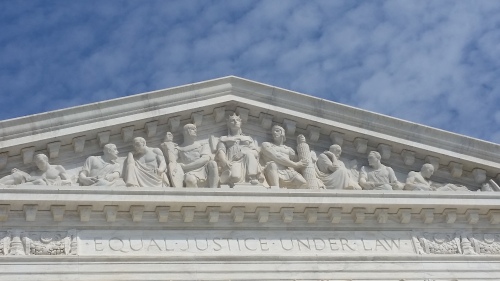
In case you were, like me, on a plane without wifi this afternoon, Justice Anthony Kennedy is retiring. Many on Twitter and in the blogosphere (not to mention the mainstream news) are bemoaning the loss of the Supreme Court “swing vote,” and decrying the “shortlist” put forward by the Trump Administration. Others, of course, are celebrating. Setting aside the dubious labeling of Justice Kennedy’s “legacy” happening, I want to address one key question: can liberals defeat the confirmation of Kennedy’s successor? And if they can, how will such a defeat happen?
A gut answer is that they can’t. Not that it’s impossible to defeat a Supreme Court nomination (see Merrick Garland), but it’s pretty difficult to do so while the President’s party controls the U.S. Senate. Five out of the last six defeated Supreme Court nominees went down before a Senate controlled by the opposing party. The exception, Harriet Miers, was doomed by conservative opposition, not the Democratic minority. As such, many observers have resigned themselves to Trump’s next nominee replacing Kennedy.
However, this does not mean that liberals can’t defeat a Trump SCOTUS nominee. In fact, I’d proffer that they can, provided that certain factors go their way.
1. Maintain Messaging Discipline
“I am not a member of any organized party – I am a Democrat”
The Will Rogers quote above may have been tongue in cheek, but it perfectly encapsulates Democrats’ current problem. Compared to Republicans, Democrats have a greater amount of ideological diversity within their party. This diversity has allowed Democrats to maintain a close gap in the Senate despite being sharply outnumbered in the number of states that lean in their direction. However, this diversity also means that it is difficult to keep the caucus united. However, if Democrats are to win a SCOTUS battle, it’ll be because they maintained, if not unity, then messaging discipline.
Take the example of Merrick Garland. Within hours of Justice Scalia’s passing, Senate Majority Leader Mitch McConnell announced that he would leave that seat open until after the 2016 Presidential election. That became the official stance of the Republican Party relatively quickly and stayed consistent throughout the election. To win this battle, Democrats need to maintain a similar messaging discipline.
2. Highlight the Right Messenger
Let’s say you’re a swing voter who is undecided about the new nominee President Trump has sent forward for Kennedy’s seat. The nominee seems smart, competent, and reminds you of your next door neighbor (the one who always has his lawn mowed). Now, you hear your Democratic senator call the nominee a “conservative ideologue” and an “extreme right-wing jurist.” Is that going to convince you to oppose the nominee? More importantly, will it persuade you to pick up the phone and call your senator? My guess is no.
Now, instead, let’s say you see the following ad on television:
A young man in a military uniform stands before an American flag. He explains that he and his brother enrolled in the military together to serve their country; that they served several tours of duty together. Then one day, his brother died. Not because of the enemy, but because the military contractor in charge of making body armor cut corners and sent him shoddy equipment. He goes on: his family sued the contractor, demanding justice, but that the case was thrown out by the judge on a technicality. Another judge would have given them a chance to refile. This judge didn’t care. And now the President wants to give this judge a promotion.
Isn’t that more likely to move you to action?
Even if you disagree with the example I’ve laid out, there is evidence that campaigns with a personal touch are remarkably effective.
In 2014, conservative groups successfully defeated the nomination of NAACP attorney Debo Adegbile to head the DOJ’s Civil Rights Division. The opposition was largely based on Adegbile’s representation of Mumia Abu-Jamal, who was convicted of the 1981 murder of Philadelphia police officer Daniel Faulkner. Conservatives effectively leveraged the testimony of Maureen Faulkner, the officer’s widow, who publicly urged senators to oppose Adegbile.
More recently, California voters threw out Judge Aaron Persky based on his sentencing Brock Turner, convicted of sexual assault, to a six months in prison. Persky’s recall, while supported by political officials, was ultimately kickstarted by the victim’s statement going viral, reinforcing the theme: highlighting the right messenger is key.
If Democrats do defeat the next SCOTUS nominee, it’ll be because they stepped back and highlighted the right messengers to make these arguments.
3. Raise the Political Cost of a Yes Vote
In 2014, I was meeting with the staffer of a Senate Democrat, a moderate and key swing vote, to urge the support of a particularly embattled nominee. I listed all the reasons that the nominee was well-qualified for the position, explained the spuriousness of the opposition’s charges, and detailed the importance of filling this position. The staffer listened to me politely. As I finished, he stated that he understood my points and added:
“If you want the senator to ignore the fact that constituents contacting the office in opposition outnumber supporters 10:1, that’s one thing; when it’s 100:1, our hands are tied.”
The staffer’s point was clear. The merits of a particular stance on a nominee don’t ultimately decide the vote. The vote is dictated by the political cost of voting yes. In this case, the senator couldn’t vote to support the nominee unless the political cost was lower.
Similarly, if liberals want to defeat a Trump SCOTUS nominee, their top priority needs to be to highlight the political costs of a “yes” vote. And this requires erasing the engagement gap.
4. Erase the Engagement Gap
Conservatives care more about courts than liberals. They have for years. It is because of their view on judges that Donald Trump is now President. It is because of their view on judges that McConnell felt politically safe in holding open a Supreme Court seat for a new President to fill, and why he feels safe in filling Kennedy’s vacancy, even though we are less than six months from an election.
There are many reasons why this engagement gap exists, not the least of which being that conservatives have carefully tilled the ground on court issues for the last forty years. Liberals, having focused on a variety of other issues, are now trying to catch up. I feel safe in predicting that, without erasing the engagement gap on judges, liberals cannot win a SCOTUS fight. And to erase the engagement gap, liberals need to build the appropriate infrastructure.
5. Build the Infrastructure
Name a prominent conservative organization:
Some of you would name the Federalist Society, the conservative legal organization whose membership card can be found in the wallets of many judges and nominees. Others might suggest the National Rifle Association (NRA), one of the most powerful pro-gun lobbying groups in the country. Other names should come to mind quickly: Focus on the Family; Moral Majority; Christian Coalition of America; Family Research Council, etc. What do all these organizations have in common? They are all involved in judicial politics (Now, the Federalist Society does not take positions on judges, but prominent FedSoc leader Leonard Leo advises the President on judicial issues).
Now name a prominent liberal organization:
Most of you would name the ACLU, which is one of the only organizations on the left whose fundraising and membership rival the conservative groups mentioned above. However, unlike the groups noted above, the ACLU does not take a position on nominations and steers clear of judicial politics.
While other organizations, including Planned Parenthood, NARAL, the Leadership Conference, and People for the American Way, do get involved on judges, their ability to mobilize voters and constituents still pales in comparison.
Take an example:
The Judicial Crisis Network, run by Justice Thomas clerk Carrie Severino, has raised and spent millions to fight Obama judges and promote Trump’s picks. Yet, no liberal equivalent existed until this year, when Demand Justice was founded.
To be clear, the infrastructure gap will not go away overnight, but Democrats will only be able to win a SCOTUS fight if they have managed to significantly narrow it.
As the SCOTUS fight unfolds and both sides flex their muscle, keep an eye on the five factors highlighted above. Conservatives have shown how to win on judges for decades, but if liberals can maintain unity, highlight the right messenger, raise the political cost of a yes vote, erase the engagement gap, and build the infrastructure, they may be able to pull off an upset.




